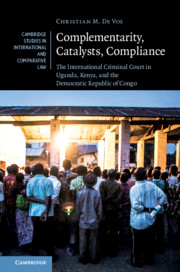 Complementarity, Catalysts, Compliance
Complementarity, Catalysts, Compliance Implementation as Domestic Politics
from Part II - The ICC in Uganda, Kenya and the Democratic Republic of Congo
Published online by Cambridge University Press: 16 April 2020
This chapter explores the relationship between ICC interventions and efforts to reform the normative legal frameworks in Uganda, Kenya and the Democratic Republic of Congo with respect to atrocity crimes. It argues that it was less the ICC’s intervention or the desire to undertake domestic prosecutions that catalysed the passage of national implementation legislation in Uganda or Kenya; rather, implementation of the Statute was undertaken at certain political moments in order to ‘perform’ complementarity, typically for international audiences. But while the power of external constituencies was largely responsible for driving the implementation process, it often glossed over deeper concerns about the desirability of pursuing criminal accountability. The chapter also illustrates how the near identical importation of the Rome Statute’s substantive and procedural provisions reflects an increasingly disciplinary approach to implementation. By contrast, in the DRC, political mistrust in international judicial intervention not only thwarted the passage of comprehensive implementing legislation for many years, but appeared to encourage a more syncretic approach to implementation later on. Further, political contestation within the DRC was itself a catalyst that allowed other implementation strategies to take root, including the direct application of the Rome Statute by Congolese military judges in domestic proceedings.
To save this book to your Kindle, first ensure [email protected] is added to your Approved Personal Document E-mail List under your Personal Document Settings on the Manage Your Content and Devices page of your Amazon account. Then enter the ‘name’ part of your Kindle email address below. Find out more about saving to your Kindle.
Note you can select to save to either the @free.kindle.com or @kindle.com variations. ‘@free.kindle.com’ emails are free but can only be saved to your device when it is connected to wi-fi. ‘@kindle.com’ emails can be delivered even when you are not connected to wi-fi, but note that service fees apply.
Find out more about the Kindle Personal Document Service.
To save content items to your account, please confirm that you agree to abide by our usage policies. If this is the first time you use this feature, you will be asked to authorise Cambridge Core to connect with your account. Find out more about saving content to Dropbox.
To save content items to your account, please confirm that you agree to abide by our usage policies. If this is the first time you use this feature, you will be asked to authorise Cambridge Core to connect with your account. Find out more about saving content to Google Drive.